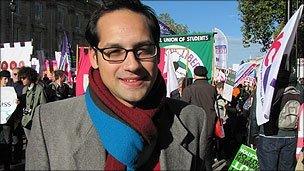NUS leader Porter will step down at next election
- Published

Aaron Porter's time in office saw a huge revival in student activism
Aaron Porter, president of the National Union of Students, is not seeking re-election.
Mr Porter, leader of the NUS through its high-profile campaigns over tuition fees, will stand down in April.
The NUS leader has faced increasingly personal attacks from within the student protest movement.
Mr Porter says that the campaign over fees is "moving into a different landscape" and the union needs a new president.
The 26-year-old student leader has been at the centre of the political storm surrounding the raising of tuition fees.
'Fresh start'
Mr Porter had been expected to stand for re-election, but has now taken the decision not to run for the NUS presidency next month.
He says he is confident he would have won the election, but believed that there was a need for a "fresh start" for leading the union.
In an e-mail to members, Mr Porter says: "After considerable soul searching, I believe there needs to be a new president to lead the student movement into that next phase."
The pressure on the NUS leader, often from radicals within the student movement, is an "occupational hazard", he said. "I've had to grow a thick skin."
He says he can step down with pride at the impact of the NUS tuition fees pledge campaign during the last general election.
"We've kick started a wave of student action, brought the coalition to its knees, and we've shaped the public debate on education in an unprecedented fashion," he has told students.
Many Liberal Democrat candidates signed an NUS pledge that they would vote against any fee increase - and the breaking of this pledge by the Lib Dem leadership became a focus for tuition fee campaigners.
"It was the most effective campaign of 2010. It brought more scrutiny of the government than any other campaign," he said.
Mr Porter's time in office saw an unprecedented upsurge in student activism, with campus occupations and protests.
The biggest student protest march, last November, drew 50,000 people - but later spilled over into violence, which saw the smashing of the Conservatives' office building in Millbank.
Mr Porter strongly condemned the violence, beginning a battle on two fronts for the NUS leader - against students wanting a more militant campaign and the government as it pushed through plans to increase tuition fees to up to £9,000 per year.
In terms of his successor, he called for a leader who would be able to represent the broad mainstream of student opinion - and to avoid the tuition fee campaign being exploited by vocal extremists.
"I would hate to see the good work being plundered," he said.
- Published25 January 2011